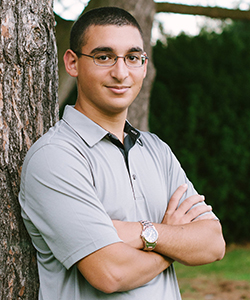
In the spring of 2017, Stephen Costa and his coworkers at Independence Blue Cross were closely following the debate raging over health care reform. The junior mathematics and finance major knew that a new health care policy could affect his work on the company's Medicare Advantage plans — but how?
"Especially early in the year when the plans were being proposed, we didn't know what was going to happen," he says. "How do you create insurance plans when the entire marketplace could change?"
It was his second co-op in the actuarial department of Independence Blue Cross (IBX) - the largest health insurer in the Philadelphia region, serving over 8.3 million people nationwide. Costa helped price IBX's Medicare Advantage plans, which offer Medicare alternatives to residents of five Pennsylvania counties.
It's a complicated task that requires a firm understanding of actuarial science - a mathematical discipline that charges business professional with mitigating risk and protecting companies from loss. Costa joined Drexel on the mathematics department's actuarial track, intrigued by the profession's ability to support the goals and interests of both a company and its customers.
"I've always known that whatever I do, I want to make a meaningful contribution to society. At the most fundamental level, that drove my career choice," he says. "Every once in a while I get to work directly with a member, but on a day-to-day basis with my team, I try to recognize, 'Here's something I can do that's going to make life easier on everyone else.' I love those types of projects because they are intellectually stimulating and rewarding, and I can see how they have a direct impact."
This problem-solving mindset drove Costa to success during an IBX competition to write an innovative business plan. Costa and his team devised a strategy to reach older health care members, which they presented to senior management, ultimately winning the competition. He attributes the success to skills acquired in Drexel's math program.
"I am very analytically minded, but the program helped me learn how to present that to people," he says. "Both in classes and at work, it's been emphasized to me that you have to know your audience. I feel like I've gotten better at communicating, which is a new skill for me."
Costa says that beyond his new confidence in presenting his ideas, the math program has required him "to stretch to think differently." The theoretical aspect of the program has been particularly useful.
He points to Anatolii Grinshpan, PhD, assistant teaching professor of mathematics, as a challenging professor who forces students to step outside of their intellectual comfort zones. Instead of showing you how to solve a proof, Costa says, Grinshpan teaches you the elements of a proof and asks you to apply them to a new problem.
"You can approach a proof in math in a million different ways, but only a handful of those are efficient or actually work," Costa says. "It's about learning how to become more efficient mentally. The more creatively I can think, the more likely I am to come up with a different solution for a problem."
Costa will continue stretching his thinking during his third actuarial science co-op — in the retirement group of Willis Towers Watson, a global advisory, broking and solutions company — and as he continues down the path toward becoming a certified actuary. Though most employers expect recent graduates to have passed two actuarial exams, Costa passed his fourth exam in February.